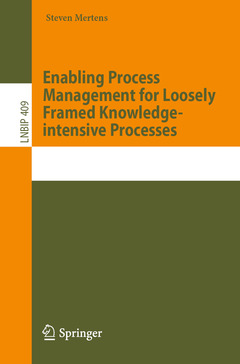Enabling Process Management for Loosely Framed Knowledge-intensive Processes, 1st ed. 2020 Lecture Notes in Business Information Processing Series, Vol. 409
Auteur : Mertens Steven

This book is a revised version of the PhD dissertation written by the author at the Department of Business Informatics and Operations Management at Ghent University in Belgium.
It addresses shortcomings in Business Process Management concerning loosely framed knowledge-intensive processes, which are characterized by their numerous valid process variants and their reliance on knowledge workers to apply their knowledge to decide on a suitable process variant that fits the context of a specific process execution. The goal was to lay the foundation for a process-aware business process management (IT-)system to support such processes. Several proof-of-concept implementations have been made for the core components and were evaluated in the domain of the healthcare. Starting from an artificial, but realistic, case about patients that arrive in the emergency room with suspected arm fractures and later progressing to a case study of the diagnosis and treatment of patients in the emergency department of a real hospital, using data from their patient files.
In 2020, the PhD dissertation won the ?CAiSE PhD award?, granted to outstanding PhD theses in the field of Information Systems Engineering.
1 Introduction.- 1.1 Terminology and Research Context.- 1.2 Problem Statement.- 1.3 Research Objectives.- 1.4 Research Methodology.- 1.5 Dissertation Structure.- 2 Towards a Decision-aware Declarative Process Modeling Language for Knowledge-intensive Processes.- 2.1 Introduction.- 2.2 Related Work.- 2.3 Research Methodology.- 2.4 Language Requirements.- 2.5 Designing the Perspectives.- 2.5.1 The arm fracture case.- 2.5.2 Declare as a foundation.- 2.5.3 Extending the functional and control-flow perspectives.- 2.5.4 Adding a notion of time-awareness to the constraint templates.- 2.5.5 Supporting the data perspective.- 2.5.6 Supporting the resource perspective.- 2.6 Integrating the Perspectives.- 2.6.1 Integrating the data perspective.- 2.6.2 Integrating the resource perspective.- 2.6.3 DeciClare.- 2.7 Evaluation.- 2.7.1 The evaluation set-up.- 2.7.2 Evaluating the perceived semantic quality.- 2.7.3 Evaluating the pragmatic quality.- 2.7.4 Evaluating the language-domain appropriateness.- 2.8 Positioning of DeciClare in the Research Domain.- 2.9 Conclusion.- 2.10 Limitations and Future Work.- 3 Discovering Loosely Framed Knowledge-intensive Processes using DeciClareMiner.- 3.1 Introduction.- 3.2 Related Work.- 3.3 Modeling Healthcare Processes: DeciClare.- 3.4 Research Methodology.- 3.5 Discovering Healthcare Process Models: DeciClareMiner.- 3.5.1 Phase 1: Mining decision-independent rules.- 3.5.1.1 Leveraged property.- 3.5.1.2 The iteration principle: optimizations.- 3.5.1.3 The join criteria.- 3.5.1.4 The join step.- 3.5.1.5 Running example.- 3.5.1.6 The output of the first phase.- 3.5.2 Phase 2: Mining decision-dependent rules.- 3.5.2.1 Fitness Function.- 3.5.2.2 Optimization.- 3.5.2.3 Running example.- 3.5.2.4 The output after the second phase.- 3.6 Evaluation.- 3.6.1 Dataset.- 3.6.2 Benchmark creation.- 3.6.3 Results.- 3.6.4 Discussion.- 3.7 Limitations.- 3.8 Conclusions and Directions for Future Research.- 4 Integrated Declarative Process and Decision Discovery of the Emergency Care Process.- 4.1 Introduction.- 4.2 Research Methodology.- 4.3 Discovering the Emergency Care Process with DeciClareMiner.- 4.3.1 Extraction.- 4.3.2 Data Preprocessing.- 4.3.3 Log Preparation.- 4.3.4 Mining a Process and Decision Model.- 4.3.5 Evaluation.- 4.4 Method Application: The Emergency Care Process.- 4.4.1 Extraction.- 4.4.2 Data Preprocessing.- 4.4.3 Log Preparation.- 4.4.4 Mining a Process and Decision Model.- 4.4.5 Evaluation.- 4.4.6 Discussion.- 4.5 Conclusion and Future Research.- 5 Operational Support for Loosely Framed Knowledge-intensive Processes.- 5.1 A Generic Framework for Flexible and Data-Aware Business Process Engines.- 5.1.1 Introduction.- 5.1.2 Research Methodology.- 5.1.3 Problem Statement and Solution Requirements.- 5.1.4 Data-Aware Declarative Process Enactment Framework.- 5.1.5 Demonstration.- 5.1.5.1 Process Definition: DeciClare.- 5.1.5.2 DeciClareEngine.- 5.1.5.3 Related Work.- 5.1.5.4 Conclusion and Future Research.- 5.2 Comparing Strategies to Generate Experience-based Clinical Process Recommendations that Leverage Similarity to Historic Data.- 5.2.1 Introduction.- 5.2.2 Related Work.- 5.2.3 Terminology and Formal Problem Definition.- 5.2.4 Research Methodology.- 5.2.5 Strategies.- 5.2.5.1 Pre-calculated similarity scorers.- 5.2.5.2 Positionless similarity scorers.- 5.2.5.3 Variable-position similarity scorers.- 5.2.5.4 Combinated scorers.- 5.2.6 Experiments.- 5.2.6.1 Experiment 1: comparing the general predictive power over different data sets.- 5.2.6.1.1 Experimental setup.- 5.2.6.1.2 Computational results.- 5.2.6.2 Experiment 2: the relation between predictive power and the size of H.- 5.2.6.2.1 Experimental setup.- 5.2.6.2.2 Computational results.- 5.2.7 Discussion.- 5.2.8 Conclusion and Future Research.- 6 Conclusion and Future Research.- 6.1 Research Results.- 6.2 Research Relevance and Implications.- 6.2.1 Implications for researchers.- 6.2.2 Implications for process stakeholders.- 6.2.3 Generalizability to other domains.- 6.3 Research Limitations and Future Research.- Appendix A: Arm fracture case description (based on literature).- Appendix B: Original textual DeciClare model of arm fracture case.- Available resources.- Available activities.- Available data elements.- Resource constraints.- Control-flow constraints.- Appendix C: Semi-structured interview protocol (translated from Dutch).- Appendix D: Final textual DeciClare model of arm fracture case.- Defined Elements.- Constraints.- Appendix E: The join step of DeciClareMiner (decision-independent).- Appendix F: The DeciClare templates supported by DeciClareEngine.- References.
Addresses shortcomings in Business Process Management concerning loosely framed knowledge-intensive processes
Won the CAiSE 2020 PhD award for an outstanding theses in the field of information systems engineering
Revised PhD thesis
Date de parution : 01-2021
Ouvrage de 202 p.
15.5x23.5 cm
Disponible chez l'éditeur (délai d'approvisionnement : 15 jours).
Prix indicatif 52,74 €
Ajouter au panier